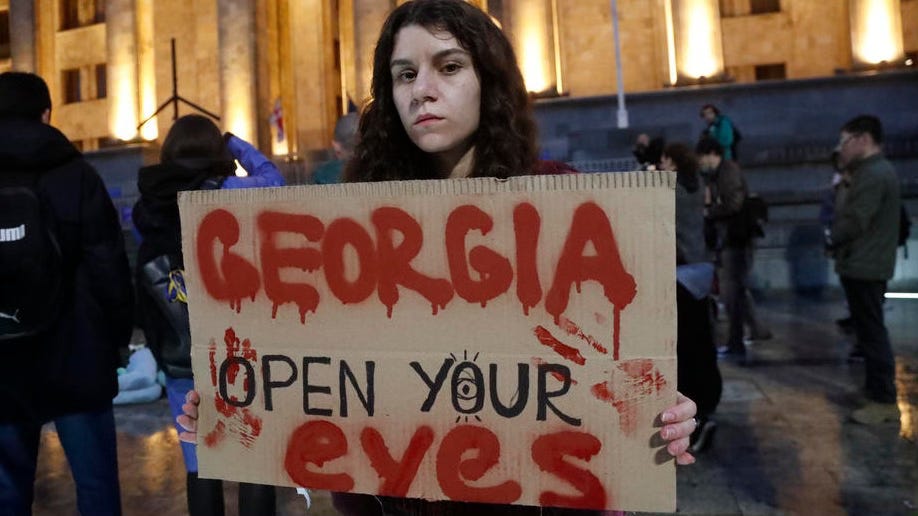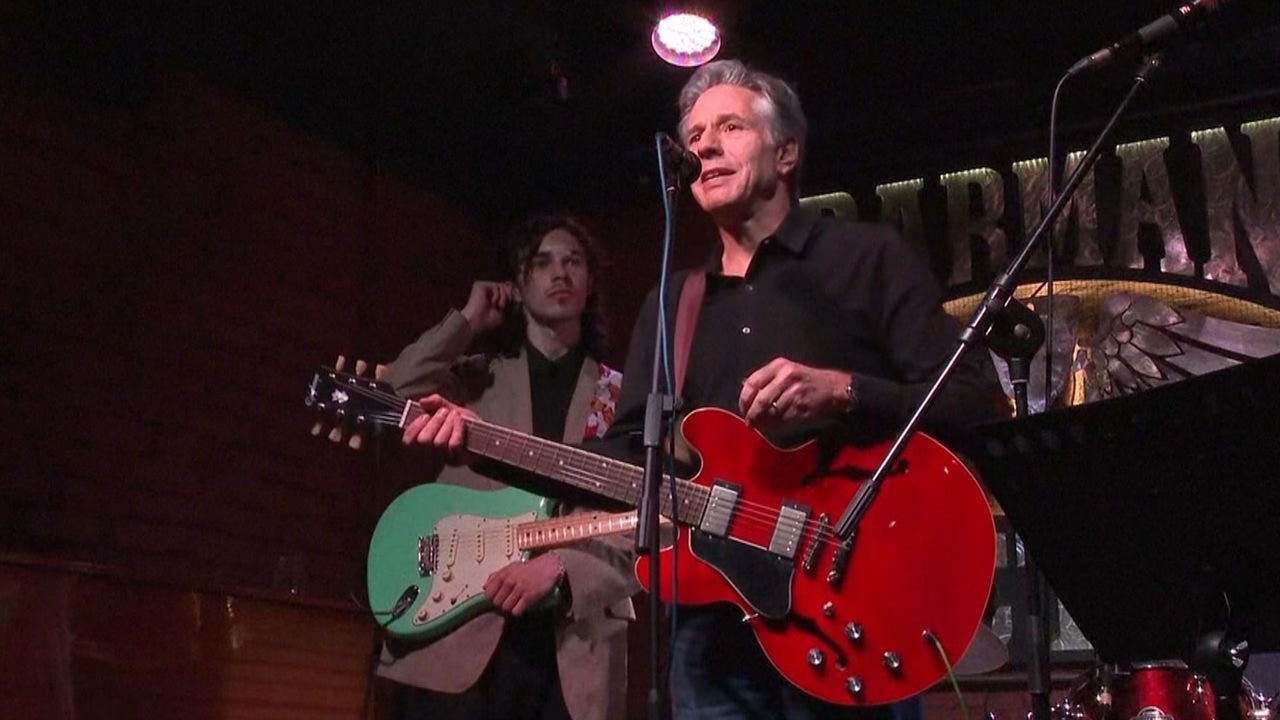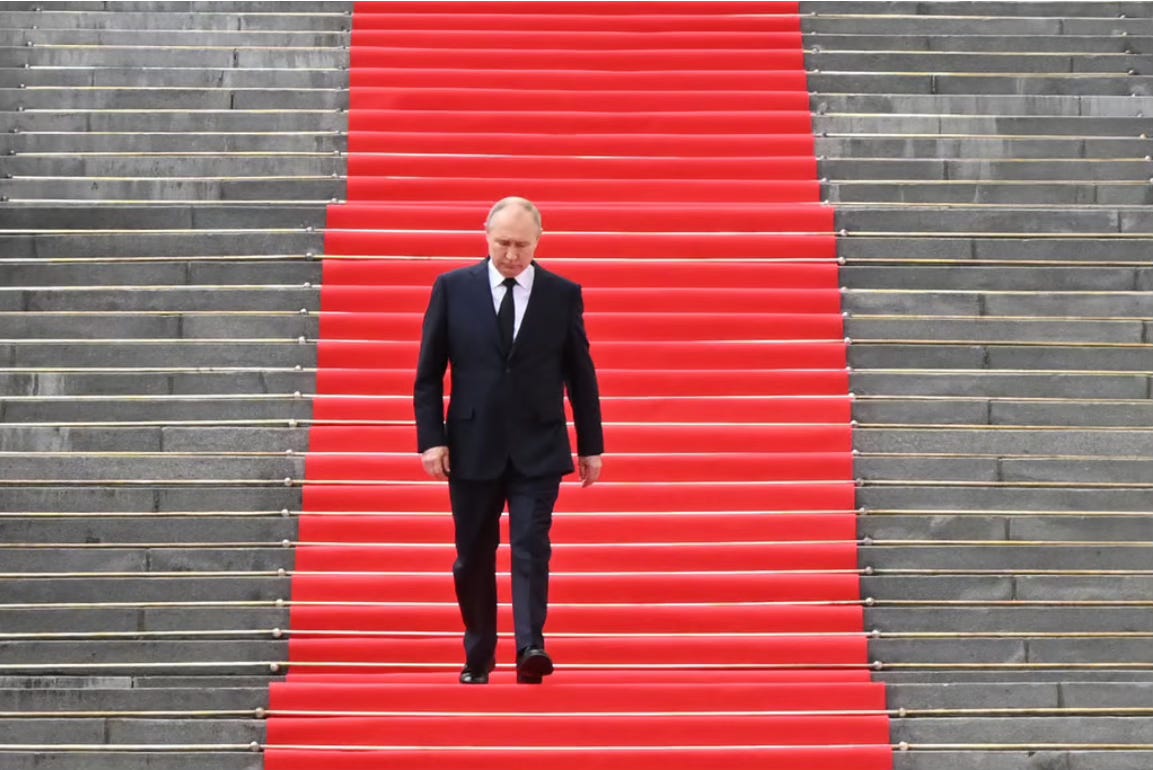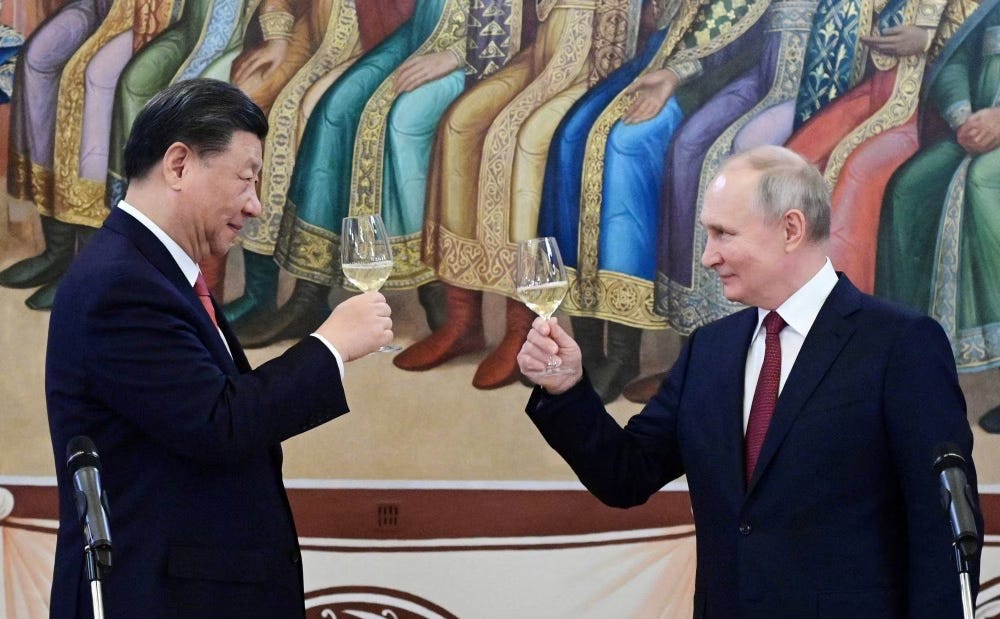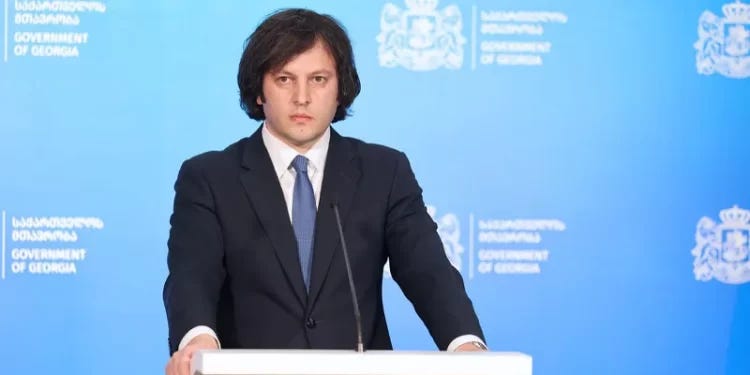Rocking in the free world
O'Brian threatens sanctions, Blinken seeking his soul, Xi-Putin meet in Beijing, Georgia: We explained “transparency of foreign influence” law to Mr. O’Brien, Global War Party conspiracy says O'Brian.
Georgian government members could face sanctions over ‘erosion of democracy’ — US official
The bill has been criticised by the US, EU, UN, NATO, OSCE and the Council of Europe. Leaders of Georgia's ruling party argue that it only serves to provide transparency of foreign funding of non-governmental organizations and news media. Georgian President Zourabichvili said she would veto the bill.
By TASS
The US will impose sanctions on members of the Georgian government if the country’s democracy suffers a setback, US Assistant Secretary of State Jim O’Brien said. He was commenting after the Georgian parliament passed a bill on foreign agents in the final reading on Tuesday.
"If the law advances against EU norms and there is an erosion of democracy and violence against peaceful demonstrators, we will see restrictions from the United States. There will be financial and/or travel restrictions specifically on those responsible and their families," the diplomat said at a news conference in Tbilisi.
O’Brien, who arrived in Tbilisi on Tuesday, called for those who used force against protesters opposing the bill to be persecuted.
He held talks with Georgian President Salome Zourabichvili, Prime Minister Irakli Kobakhidze, Parliament Speaker Shalva Papuashvili, and members of the opposition and civil society.
The Georgian legislature began considering the bill on foreign agents in April. Since then, people have been taking to the streets in protest. Several times the rallies escalated into clashes with the police, who used pepper gas and water cannons to disperse protesters.
The bill has been criticized by the US, EU, UN, NATO, OSCE and the Council of Europe. Leaders of Georgia's ruling party argue that it only serves to provide transparency of foreign funding of non-governmental organizations and news media. Georgian President Zourabichvili said she would veto the bill.
Read more here.
Blinken desperately searches for his soul
By Joel B. Pollak (Brietbart)
“Rockin’ in the Free World’ is not a patriotic song or a celebration of freedom — though it is often misinterpreted that way — but rather a harsh criticism of the West.
U.S. Secretary of State Antony Blinken performed Neil Young’s “Rockin’ in the Free World” on the electric guitar on Tuesday night in Kyiv, Ukraine, as part of a solidarity visit to boost morale in the embattled former Soviet republic.
Blinken played rhythm guitar with The 1999 band at the Barman Dictat, a nightspot in the Ukrainian capital.
“I know this is a really, really difficult time,” Blinken said. “You need to know the United States is with you.”
He then began playing the song, originally performed by Neil Young and Crazy Horse. He also attempted to sing.
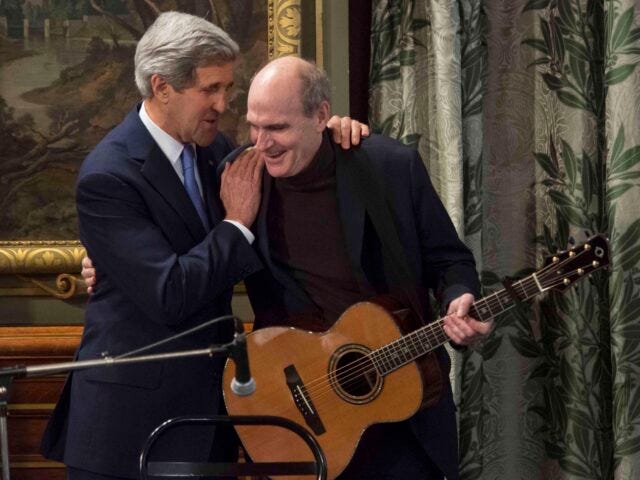
The scene recalled a bizarre event in the aftermath of a radical Islamic terror attack on the Charlie Hebdo newspaper in Paris, France, in 2015, when then-Secretary of State John Kerry, having missed a local “unity rally,” sought to console Parisians with a serenade by James Taylor, who performed “You’ve Got a Friend.”
“Rockin’ in the Free World’ is not a patriotic song or a celebration of freedom — though it is often misinterpreted that way — but rather a harsh criticism of the West. It was poorly timed — written in 1989, before the fall of communism.
Read more here.
Presidents Xi and Putin to meet in Beijing
By Cao Desheng (China Daily)
Leaders eye better cooperation as nations mark 75th anniversary of ties
During the upcoming visit, President Xi Jinping will exchange views with Putin on bilateral relations and cooperation in various fields as well as on international and regional issues of common interest in the context of the 75th anniversary of diplomatic ties between China and Russia, Foreign Ministry spokesman Wang Wenbin said on Tuesday.
The Kremlin press service said in a statement on Tuesday that the two presidents will outline priorities for further practical cooperation between the two countries and have an in-depth exchange of views on the most pressing international and regional issues.
Following their talks, the two presidents are expected to sign a joint statement and several bilateral documents, the statement said.
Xi and Putin will attend a gala event marking 75 years of diplomatic relations and the opening of the 2024-25 Russia-China Years of Culture, it said.
The statement also said that the programme of Putin's visit includes a meeting with Premier Li Qiang, during which both sides will discuss bilateral cooperation in trade, the economy and humanitarian affairs.
Putin is also expected to visit Harbin, the capital of Heilongjiang province, where he will attend the opening of the 8th China-Russia Expo and the 4th China-Russia Forum on Interregional Cooperation, it said, adding that Putin will also meet with the students and faculty of Harbin Institute of Technology.
The visit comes as both China and Russia have committed to enhance bilateral ties, which have been guided by head-of-state diplomacy.
Zhang Hanhui, Chinese ambassador to Russia, said that head-of-state diplomacy is the fundamental guarantee for China-Russia relations to move forward smoothly and steadily.
The leaders of the two countries have agreed to continue to maintain close communication, engaging in in-depth exchanges on China-Russia relations and strategic issues of mutual concern, Zhang said in an interview with Russia's RT News.
He described Putin as "an old friend" of Xi and the Chinese people, saying that China welcomed the Russian president to pay a state visit to China after assuming office.
In March last year, Xi, after being elected as Chinese president at the first session of the 14th National People's Congress, chose Russia as his first visit to a foreign country, which the ambassador said fully demonstrated the high level and special nature of the comprehensive strategic partnership of coordination between China and Russia for the new era.
As permanent members of the United Nations Security Council, China and Russia closely coordinate on the international stage and jointly uphold true multilateralism, which is beneficial for safeguarding security in the Eurasian region and global strategic stability, Zhang said.
China-Russia economic and trade cooperation made a historic breakthrough in 2023 amid the slow global recovery. Bilateral trade reached a record $240 billion in 2023, achieving the established trade target of $200 billion ahead of schedule.
In the first quarter of this year, bilateral trade between China and Russia reached $56.8 billion, a year-on-year increase of 5.2 percent, according to statistics from the Ministry of Commerce. The trade structure continues to improve, with strong cooperation trends in emerging areas such as service trade and cross-border e-commerce. Key projects, including the China-Russia crude oil pipeline, are making steady progress.
Speaking at a news conference on May 7, Liu Xuesong, director of the Department of Eurasia Affairs at the Ministry of Commerce, said that efforts will be made to further enhance China-Russia trade and investment cooperation, bolster the resilience of industrial and supply chains, and foster a favourable environment for expanding bilateral trade.
Read more here.
PM: We explained to Mr. O’Brien all the details related to this “transparency of foreign influence” law
By Georgia Today
We explained all the details related to this [Foreign Influence Transparency Act]. If there are any remarks, we are once again ready for discussion, and I have confirmed this readiness to Mr. O’Brien, – said the Prime Minister of Georgia, Irakli Kobakhidze.
Kobakhidze claimed that “a lot of things became clear to O’Brien regarding everything that is happening around the country and what happened in these bilateral relations during the past three years”.
He noted that the conversation at the meeting touched on the bilateral relations between Georgia and the US, during which he once again confirmed his desire and readiness to take as much care as possible to deepen bilateral relations.
“We had a much longer meeting with O’Brien than planned, it was scheduled for 1 hour and lasted two and a half hours. It was a very sincere meeting. We spoke frankly about all the issues related to Georgia-US bilateral relations. They talked about the processes that took place in our country during the past 3 years. We explained everything to Mr. O’Brien, once again confirmed our desire and readiness to do our best to deepen bilateral relations. This is a desire. The main thing is to get a proper and fair attitude from the other side. If there is such an attitude, we will achieve success in the development of bilateral relations.
“We also talked about the Foreign Influence Transparency Act. We explained all the details related to this law. If there are any comments, we are again open to discussion, and I have confirmed this to Mr. O’Brien.
“I think that a lot has become clear regarding everything that is happening around our country and what has been happening in these bilateral relations for the past three years. We are ready to take care of the deepening of bilateral relations, which I personally confirmed to O’Brien,” Kobakhidze noted.
Read more here.
Global War Party
Source: U.S. Embassy Tbilisi
Assistant Secretary of State for European and Eurasian Affairs James O'Brien Remarks to Media in Tbilisi
Thank you for being here tonight. I’m very glad. I’ve just completed a full day of meetings with members of the government, including the Prime Minister, the Foreign Minister, and the Speaker of Parliament. I met the President and I’ve met with members of civil society and with the opposition. I came here because the United States deeply values our relationship with Georgia. We’ve seen it as a strategic partnership and frankly, some of the recent speeches here and the actions in the Parliament have made us wonder whether our strategic interests are so shared by the government.
We’ve had a long partnership with Georgia since 1992. The United States has spent more than $6 billion in assistance. We’ve consistently supported the development of Georgia’s governing institutions, from its military to its government, its regulatory bodies, and free and fair elections.
So for more than 30 years, the US has been a strong partner of Georgia, and we hope to continue that partnership. We’ve especially valued the relationship as Georgia has sought to grow closer to European and transatlantic institutions.
Note that it was a government led by the Georgian Dream that enshrined in Georgia’s own constitution the commitment to moving toward Europe and the transatlantic relations. We were proud to have supported Georgia’s aspiration for candidacy to the European Union, and we continue to work very closely on Georgia’s development progress toward membership in NATO.
So when I came here, I was a little disturbed to find that there are two very different conversations. One concerns the law on foreign influence. Some advocates of the law say that transparency of funding must be a prime national interest of Georgia. And they feel that some Western funders are not as transparent as we might be.
Our interest is in seeing Georgia converge with European Union and transatlantic norms for addressing issues like transparency. Frankly, we think neither the process nor the actual law implemented meets that standard and we hope to have more discussions to see any step on transparency matching European norms as Georgia goes forward. We were promised that there would be the opportunity for this before the law was implemented. And I was very clear that there would be consequences if the law were implemented as it now stands.
The Prime Minister has referred to this as coercion, but it’s not. Georgia is attempting to join the EU and NATO. Those organizations have certain standards and certain referees that say what the rules are, and we simply want Georgia to continue to match those standards rather than to deviate. But there is a sense because a decision by Georgia to not converge with Europe would be a rejection of the path that is in Georgia’s own constitution.
We believe, and we see it in the polls, we see it on the streets, we hear it from every political party, including Georgian Dream, backers of Georgian Dream, the business community, and others – the Georgian people very much want to continue down that path, and we will stand with them as we have for more than 30 years. And we will stand with them going forward.
So in this sense, if the conversations that we discussed today happen and the law is properly modified, it will be a way of strengthening our partnership rather than wrenching it apart, which I fear that it is now doing.
But that was just one kind of conversation that I had. And the law is a small part of a broader conversation. The broader conversation concerns comments by leaders of Georgian Dream. That there is a global war party and that Georgia must turn away from the commitments made to the global war party. And that there is a conspiracy by the West to remove Georgian Dream from office, despite 12 years of strong cooperation. This is like a Reddit page came to life. It is unreal, wrong, and a complete misunderstanding of the international community’s relationship to Georgia.
One example of it is what the Prime Minister mentioned last night. So we had reached out for conversations with all stakeholders. We had invited the Prime Minister to Washington to discuss the law and the relationship. The European Union had discussions here and was promised time for a conversation about the law. And I asked, before coming here, I was happy to see Mr. Ivanishvili again. The Prime Minister said he would not see me because we have him under de facto sanctions. There are no sanctions on him at this point. For such an influential individual to be that badly misinformed is shocking and disappointing. For the Prime Minister to say that that is a reason that one of Georgia’s most important partners cannot meet with this citizen is to elevate that individual interest above the country’s constitutional commitment to working more with international partners and joining the EU and NATO.
So that is why I say the law is just one part of a broader conversation. But it captures what I think is so important and could be a turning point in what has been till now a constructive and productive partnership. If there are going to be demonstrations, we want them to be peaceful and we want the police presence to be peaceful. We want there to be no intimidation of the protesters or others—either at the demonstration or at their homes or against their property. As has happened in recent days, the people responsible for that intimidation should be found and prosecuted.
If the law goes forward without conforming to EU norms and this kind of rhetoric and aspersions against the US and other partners continue, I think the relationship is at risk. Just a few examples: the US has about $390 million in assistance that we are planning to spend with Georgian authorities. Half on military assistance, a little more or about another third roughly on economic development projects, and more on building institutions along with some for civil society. All that has to be under review if we are now regarded as an adversary and not a partner.
And if the law goes forward out of conformity with EU norms and there’s undermining of democracy here and there’s violence against peaceful protesters – peaceful protestors, then we will see restrictions coming from the United States. Those tend to be financial and/or travel restrictions on the individuals responsible for those actions and their families.
But I say these things not because I want them to happen, but because I want Georgia to have a continued peaceful path toward the EU and NATO with a robust democracy.
And hope is that that’s the path that will begin again today. And if not, we will revisit these topics very soon.
Question regarding problems with the law on foreign influence
Question regarding what types of standards the law should meet
Question regarding whether the law could be modified or discussed
Assistant Secretary O’Brien: To the last question, the Prime Minister said yes. Two kinds of answers to the first two questions. So our concern is with the manner in which the law came about, that we want to see Georgia work toward integration but to do it in the manner in which typically European states or partners develop rules like this rather than forcing it through over the objections and expressed concerns of partners.
Today we discussed a number of difficulties with the law. I raised some, not all agreed to, but they center around the law is under-inclusive. It applies only to foreign and in practice only to certain foreign sources of funding. This means it does not address all the problems it’s intended to address.
So the effect then is to place a stigma on entities that are believed to be covered by the law. Those entities happen to be among the most open in Georgia because they talk about their sources of funding or other things. But the organizations that run under the table that are probably financed from other countries than Western countries will not be captured. And that stigma can be very damaging as we saw with the vandalism and attacks on individuals identified as coming from those groups in the past week. That’s why the European Court of Human Rights express concern about laws that are limited in this way to just foreign financing. That’s just one problem.
Many laws in this area of transparency are conduct-based. So they would apply to anyone attempting to influence politics, not just to certain organizations. And they would be subject to judicial review before penalties. This law allows the Ministry of Justice to have access to all records of a covered organisation – not just financial records, but all records. And then to impose fines which can only then be contested in court. So it reverses the approach from U.S. laws, for example.
But again, the primary issue is that by the time we joined discussion, the European Union and we asked to have further consultations and were told no, this will be pushed through in three quick readings. And that is what we’ve seen.
Read more here.



